This article was co-authored by Jennifer Butler, MSW. Jennifer Butler is a Love & Transformation Coach and the Owner of JennJoyCoaching, a life coaching business based in Miami, Florida, although Jennifer works with clients all over the world. Jennifer’s work centers around empowering women who are navigating any stage of the divorce or breakup process. She has over four years of life coaching experience. She is also the co-host of the Deep Chats Podcast along with Leah Morris and the host of season 2 “Divorce and Other Things You Can Handle” by Worthy. Her work has been featured in ESME, DivorceForce, and Divorced Girl Smiling. She received her Masters of Social Work (MSW) from New York University. She is also a Certified Health Coach, a Communications & Life Mastery Specialist, and a Certified Conscious Uncoupling and Calling in “the One” coach.
There are 13 references cited in this article, which can be found at the bottom of the page.
wikiHow marks an article as reader-approved once it receives enough positive feedback. This article has 11 testimonials from our readers, earning it our reader-approved status.
This article has been viewed 501,427 times.
While it’s easy to believe that because past events are over and they should just go away on their own, it’s not always easy. Impactful experiences, especially traumatic ones, have the power to affect you on a neurological level, and leave traces on our body and mind that can influence your behavior for years, sometimes decades, to come.[1] The memories of these events can influence you on both a neurological and psychological level with or without your awareness of it. Learning to live with the effects of such experiences can be difficult, but is never impossible, no matter how impactful the experience was. While learning to let go of the influence of painful memories will take time and effort on your part, there are ways for you to learn to let go of painful memories.
Steps
Using Cognitive Work
-
1Recognize the physical signs of emotional trauma. Sometimes particularly impactful experiences can leave noticeable physical traces indicative of emotional trauma. If you have certain symptoms, it could be the case that the painful memories you have are associated with some emotional trauma that is affecting your physical health. No two people will ever express their reaction to trauma in the same way, so it’s important to consider your own situation individually, perhaps in dialogue with a mental health professional.
- Common physical symptoms of emotional trauma are trouble sleeping due to insomnia or nightmares, a racing or unsteady heartbeat, physical aches and pains all over your body, being easily startled, tiredness, trouble concentrating, agitation, being on edge, and tense muscles.[2]
- These symptoms can be signs of anxiety related to painful memories in the past. Engaging with and learning how to manage any anxiety that arises for you can help in easing the effects of painful memories in your everyday life.
-
2Figure out the impact. The first thing you have to figure out is precisely how painful memories might be impacting your current life. Because particularly impactful experiences in the past can affect you in the most subtle of neurological and psychological levels, you are not always aware of how they might be influencing your behavior in the present.[3] While all of your current behaviors and ideas are influenced to some extent by past behaviors, those that have left painful memories often affect you more than others.[4]
- For example, you could experience a large degree of anxiety around lakes because of a near death experience in water, or you could perhaps unconsciously avoid certain activities or locations that remind you of a deceased loved one. Whatever the case, learning exactly how such painful memories might be affecting your life in the present in order to come to terms with them and incorporating their effects into your everyday life.
- To figure out how they are impacting you, take an inventory of how you react to certain things. Think back to any noticeable changes you think you may noticed in yourself between the traumatic event and how you act now. If you aren't sure you can see any changes yourself, ask those around you have different you act or if they have seen any changes in your behavior that may point to the areas of your life the memories have impacted.
Advertisement -
3Engage with anxiety. Whenever you start to feel anxiety in situations that remind of painful memories, engage with the anxiety. Identify the memories as such and experiment with what’s happening as opposed to simply removing yourself from the situation entirely.[5] Psychologists have several different techniques for working through issues like this, but two similar and effective methods are mindsight and mindfulness.[6] In either case, the goal here is to learn to pay attention to when anxiety arises. When it does, focus on aspects of the situation you can control, such as your breath, in order to slow the situation down enough to where you now longer feel overwhelmed.
- Since breathing is one of the things you will typically always have some degree of control over, and it is connected to so many different physiological processes in your body, learning to regulate it can be a great tool for reducing anxiety when it arises. It can also be helpful to become more aware of your surroundings in general.[7]
- Do this first by yourself at home. Start by breathing in slowly, holding it in, and then releasing just as slow. Try to notice any sensations that arise when this occurs so you will be able to make such connections between your anxiety and your breath during other situations outside of your home.
-
4Focus on the future. Living in the past and in your painful memories is not healthy. You will never go forward or enjoy new things if your mind is always stuck in the past. This kind of rumination has been linked with depression, post traumatic stress disorder, anxiety, and many other issues. In order to stop ruminating, take part in activities that help your focus on the present or future. Make plans for the weekend with friends, think about a vacation you want to save up for, or think about career or life goals that you have yet to achieve. Anything positive will help you keep your focus from spiraling down into your painful memories.
- If you are still worried about changes you could have made in the past associated with the memory, think about the ways you can avoid such events in the future. If it was not under your control, think about how far you've come since the event and focus on the positive aspects of your current or future endeavors.[8]
Learning New Habits and Habits
-
1Begin a journal. Writing things down is one of the most effective ways to help with past painful events. Try journaling about your past and present in order to learn more about how you are impacted by painful memories. Putting such experiences in narrative form can give you some degree of control over how you see these experiences as being important to your life.[9] It can also allow you to tap into to emotions related to such memories that might be difficult to access otherwise.[10]
- Sit down one day and simply write about any experiences that come to mind, in as much detail as possible. This can help you incorporate the effects of painful memories for two reasons. First, it can allow you to see connections between situations in your life and your emotions. Second, writing can act as a sort of cathartic experience whereby you can feel a sense of creative freedom that might help you avoid feeling pulled down by prior life events.
- If you struggle with this, start small by simply writing about what happened to you throughout the day. If you feel any urge to connect what happened to anything that happened to you in your past, allow those connections to be made without forcing your writing to go in one particular direction as opposed to another.
-
2Cultivate joyful habits. In order to help you get over painful memories, try to make new, better memories and form new habits. Painful memories can consume you if you spend too much time alone and ignore your own intrinsic desire for relationships with other people. Surround yourself with people and activities that bring you joy. Humans are innately social creatures, and so any sense of pleasure or joy will very likely involve interpersonal relationships with other people, especially those involving touch or other forms of intimacy.[11]
- This doesn’t mean you should just hang out with anyone. It will likely take some degree of effort on your part to figure out what really brings you joy. But once you find an activity or group of people that do so, try to restructure your daily life in order to maximize the time you spend in such situations.
-
3Mix up your routine. Getting stuck in a normal routine can give you too much time to think about the past. Try to experiment with your environment and social groups in order to mix up your routine every other day or so. This is especially true if you sense a lack of pleasure in your daily life. If you notice yourself becoming noticeably preoccupied with painful memories from the past, it might be necessary to push yourself outside of your comfort zone and put yourself in environments you’ve never been in before.[12]
- If you persistently feel isolated from others and unable to meet people who support you, it might be necessary to experiment by interacting with entirely new people in situations you wouldn’t typically be. This can lead you to meet the right type of people who might be able to support you in the ways that you need. This will also hopefully help you become less preoccupied with the past by giving you more interesting activities and people to focus on in the present.
- Try taking a class on mixed martial arts or yoga. You could even simply go on a walk in the park. The key here is simply to put yourself in situations in which you would not typically find yourself, or around people you would not typically hang out with. Painful memories can become part of a psychological feedback loop that become part of your everyday routine and habits otherwise.
Getting Outside Help
-
1Ask for outside input. If you feel like you need an outside perspective or you find it hard to get out of your own head, ask others if they’ve noticed anything different about you since the experience that left you with the painful memory. This will require some courage on your part, as they might tell you something you don’t want to hear. However, other people, especially those closest to you, are often able to pick on things about you that you fail notice.
- Ask someone you trust, such as your best friend, your sibling, your parent, or trusted colleague, while approaching them without any preconceived notions.
-
2Join a support group. If you cannot find supportive people on your own or you want to talk to someone that isn't a loved one or in your group of friends, try joining a support group that focuses on the type of problems you are suffering from. There are countless out there that focus on a wide range of issues, such as substance use problems, domestic violence, grieving the death of a loved one, or anxiety and depression.
- There are online databases that help you look for the right group for you. You can also ask your doctor or a mental health professional for suggestions if you can’t find any on your own. [13]
-
3Visit a mental health professional. If you cannot deal with your painful memories on your own, find a mental health professional that specialized in trauma to help you with you issues. You should also seek professional help when the painful memories become unbearable on your own. Mental health professionals, such as counselors or therapists, are trained in suggesting various coping skills or implementing therapeutic techniques that are intended to help people become more productive or constructive with in their daily lives, despite painful experiences they might have had in the past. There is nothing wrong with asking for help. Don't feel like a failure or be embarrassed to ask for help.
- If painful memories are keeping you from functioning on a day to day basis in the way that you want, and if the pain associated with them doesn’t seem to subside with time, visiting a mental health professional could be helpful. He or she can lend an ear to your story and suggest some tricks for dealing with such issues. In order to help you engage with painful memories that might have resulted in some sort of traumatic affection to your day-to-day life, a mental health professional might implement the following a myriad of techniques.[14]
-
4Try cognitive-behavioral therapy (CBT). CBT is a popular method for the treatment of past trauma. CBT is a typically short term, problem focused approach to anxiety and depression, where the therapist helps you with your beliefs and thought processes. They help you align them more functionally with your desires. It is more active than other forms of therapy, in that it takes effort from you to help you change your behaviors and thoughts. Your therapist will help you work through issues, give you exercises and treatments to do at home, and help you change your overall behavior.[15]
- Look for a mental health professional that specializes in this method if you think it might be effective for your particular situation.
-
5Ask about eye movement desensitization and reprocessing (EMDR). Your mental health professional may also try eye movement desensitization and reprocessing (EMDR). EMDR takes advantage of your body’s natural reactions to past experiences by using eye movements to unlock memories and allow you to engage with them more easily. This method uses repetitive eye movements along with CBT to help trigger traumatic memories so you can deal with them instead of repressing them. This method treats mental health in the same way as physical health. If you have a traumatic memory festering in your mind, it will never have time to heal, despite your brain's natural healing ability.
- By uncovering your past trauma and dealing with it using EMDR, you can move past your painful memories and go toward mental health.[16]
Expert Q&A
Did you know you can get expert answers for this article?
Unlock expert answers by supporting wikiHow
-
QuestionWhat can I do to get over losing my job?
 Jennifer Butler, MSWJennifer Butler is a Love & Transformation Coach and the Owner of JennJoyCoaching, a life coaching business based in Miami, Florida, although Jennifer works with clients all over the world. Jennifer’s work centers around empowering women who are navigating any stage of the divorce or breakup process. She has over four years of life coaching experience. She is also the co-host of the Deep Chats Podcast along with Leah Morris and the host of season 2 “Divorce and Other Things You Can Handle” by Worthy. Her work has been featured in ESME, DivorceForce, and Divorced Girl Smiling. She received her Masters of Social Work (MSW) from New York University. She is also a Certified Health Coach, a Communications & Life Mastery Specialist, and a Certified Conscious Uncoupling and Calling in “the One” coach.
Jennifer Butler, MSWJennifer Butler is a Love & Transformation Coach and the Owner of JennJoyCoaching, a life coaching business based in Miami, Florida, although Jennifer works with clients all over the world. Jennifer’s work centers around empowering women who are navigating any stage of the divorce or breakup process. She has over four years of life coaching experience. She is also the co-host of the Deep Chats Podcast along with Leah Morris and the host of season 2 “Divorce and Other Things You Can Handle” by Worthy. Her work has been featured in ESME, DivorceForce, and Divorced Girl Smiling. She received her Masters of Social Work (MSW) from New York University. She is also a Certified Health Coach, a Communications & Life Mastery Specialist, and a Certified Conscious Uncoupling and Calling in “the One” coach.
Love & Empowerment Coach
-
QuestionHow can I force myself to stop obsessing over the past?
 Jennifer Butler, MSWJennifer Butler is a Love & Transformation Coach and the Owner of JennJoyCoaching, a life coaching business based in Miami, Florida, although Jennifer works with clients all over the world. Jennifer’s work centers around empowering women who are navigating any stage of the divorce or breakup process. She has over four years of life coaching experience. She is also the co-host of the Deep Chats Podcast along with Leah Morris and the host of season 2 “Divorce and Other Things You Can Handle” by Worthy. Her work has been featured in ESME, DivorceForce, and Divorced Girl Smiling. She received her Masters of Social Work (MSW) from New York University. She is also a Certified Health Coach, a Communications & Life Mastery Specialist, and a Certified Conscious Uncoupling and Calling in “the One” coach.
Jennifer Butler, MSWJennifer Butler is a Love & Transformation Coach and the Owner of JennJoyCoaching, a life coaching business based in Miami, Florida, although Jennifer works with clients all over the world. Jennifer’s work centers around empowering women who are navigating any stage of the divorce or breakup process. She has over four years of life coaching experience. She is also the co-host of the Deep Chats Podcast along with Leah Morris and the host of season 2 “Divorce and Other Things You Can Handle” by Worthy. Her work has been featured in ESME, DivorceForce, and Divorced Girl Smiling. She received her Masters of Social Work (MSW) from New York University. She is also a Certified Health Coach, a Communications & Life Mastery Specialist, and a Certified Conscious Uncoupling and Calling in “the One” coach.
Love & Empowerment Coach Set an active intention to stop thinking about it. Then, make choices that help you work towards that intention. It could be starting a new hobby, building a new relationship, or finding a new job. Eventually, you will fall in love with the process of working towards things you want, and you won't keep worrying about your past.
Set an active intention to stop thinking about it. Then, make choices that help you work towards that intention. It could be starting a new hobby, building a new relationship, or finding a new job. Eventually, you will fall in love with the process of working towards things you want, and you won't keep worrying about your past. -
QuestionHow can I stop hating myself for focusing on the negative?
 Jennifer Butler, MSWJennifer Butler is a Love & Transformation Coach and the Owner of JennJoyCoaching, a life coaching business based in Miami, Florida, although Jennifer works with clients all over the world. Jennifer’s work centers around empowering women who are navigating any stage of the divorce or breakup process. She has over four years of life coaching experience. She is also the co-host of the Deep Chats Podcast along with Leah Morris and the host of season 2 “Divorce and Other Things You Can Handle” by Worthy. Her work has been featured in ESME, DivorceForce, and Divorced Girl Smiling. She received her Masters of Social Work (MSW) from New York University. She is also a Certified Health Coach, a Communications & Life Mastery Specialist, and a Certified Conscious Uncoupling and Calling in “the One” coach.
Jennifer Butler, MSWJennifer Butler is a Love & Transformation Coach and the Owner of JennJoyCoaching, a life coaching business based in Miami, Florida, although Jennifer works with clients all over the world. Jennifer’s work centers around empowering women who are navigating any stage of the divorce or breakup process. She has over four years of life coaching experience. She is also the co-host of the Deep Chats Podcast along with Leah Morris and the host of season 2 “Divorce and Other Things You Can Handle” by Worthy. Her work has been featured in ESME, DivorceForce, and Divorced Girl Smiling. She received her Masters of Social Work (MSW) from New York University. She is also a Certified Health Coach, a Communications & Life Mastery Specialist, and a Certified Conscious Uncoupling and Calling in “the One” coach.
Love & Empowerment Coach
References
- ↑ Van der Kolk, B. (2014). The Body Keeps the Score: Brain, Mind, and Body in the Healing of Trauma (1 edition). New York: Viking.
- ↑ http://www.helpguide.org/articles/ptsd-trauma/emotional-and-psychological-trauma.htm
- ↑ Damasio, A. (2003). Looking for Spinoza: Joy, Sorrow, and the Feeling Brain (Reprint edition). Orlando, Fla.: Harvest.
- ↑ Cambria, E., Livingstone, A., & Hussain, A. (2012). The Hourglass of Emotions. In A. Esposito, A. M. Esposito, A. Vinciarelli, R. Hoffmann, & V. C. Müller (Eds.), Cognitive Behavioural Systems (pp. 144–157). Springer Berlin Heidelberg. Retrieved from http://link.springer.com/chapter/10.1007/978-3-642-34584-5_11
- ↑ Jennifer Butler, MSW. Life Coach. Expert Interview. 31 July 2020.
- ↑ Siegel, R. D. (2010). The Mindfulness Solution: Everyday Practices for Everyday Problems (1 edition). New York: The Guilford Press.
- ↑ Barrera, T. L., Grubbs, K. M., Kunik, M. E., & Teng, E. J. (2014). A Review of Cognitive Behavioral Therapy for Panic Disorder in Patients with Chronic Obstructive Pulmonary Disease: The Rationale for Interoceptive Exposure. Journal of Clinical Psychology in Medical Settings, 21(2), 144–154. http://doi.org/10.1007/s10880-014-9393-4
- ↑ http://psychcentral.com/blog/archives/2011/01/20/why-ruminating-is-unhealthy-and-how-to-stop/
- ↑ Jennifer Butler, MSW. Life Coach. Expert Interview. 31 July 2020.
- ↑ Mello, S. D’, & Mills, C. (2014). Emotions while writing about emotional and non-emotional topics. Motivation & Emotion, 38(1), 140–156
- ↑ Jennifer Butler, MSW. Life Coach. Expert Interview. 31 July 2020.
- ↑ Bennardo, G. (2009). Language, Space, and Social Relationships: A Foundational Cultural Model in Polynesia. Cambridge University Press
- ↑ http://www.traumasurvivorsnetwork.org/pages/peer-support-groups
- ↑ http://www.helpguide.org/articles/ptsd-trauma/emotional-and-psychological-trauma.htm
- ↑ Knaus, D. W. J., & Carlson, J. P. E. (2014). The Cognitive Behavioral Workbook for Anxiety: A Step-By-Step Program (Second Edition edition). Oakland, CA: New Harbinger Publications
- ↑ http://www.helpguide.org/articles/ptsd-trauma/emotional-and-psychological-trauma.htm


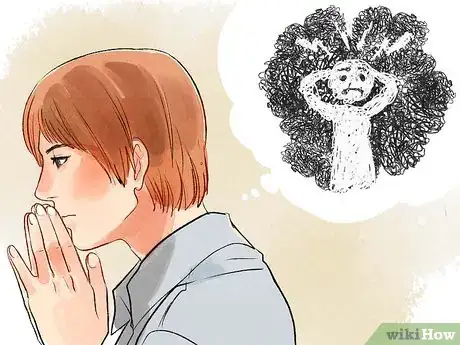

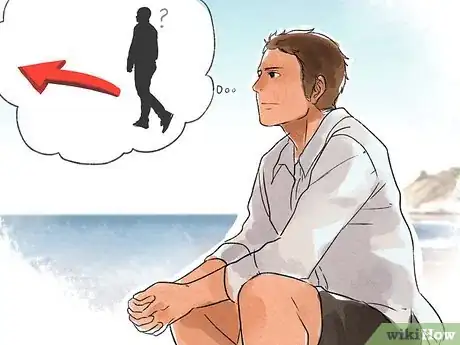
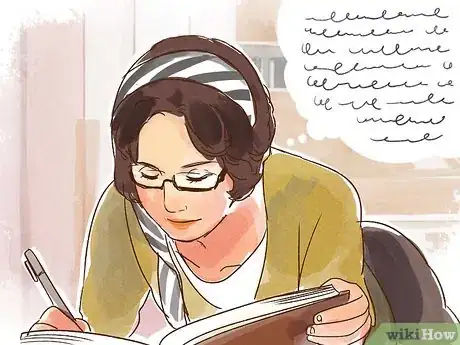


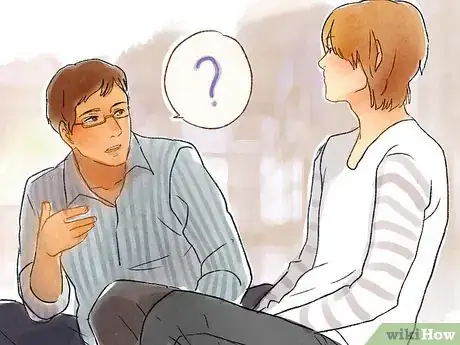
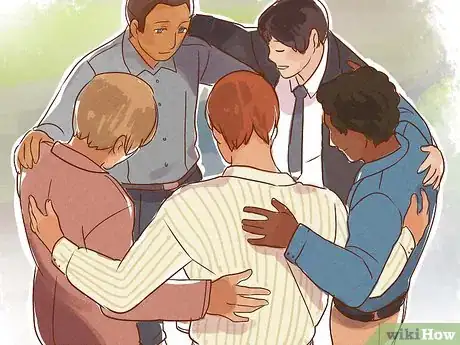

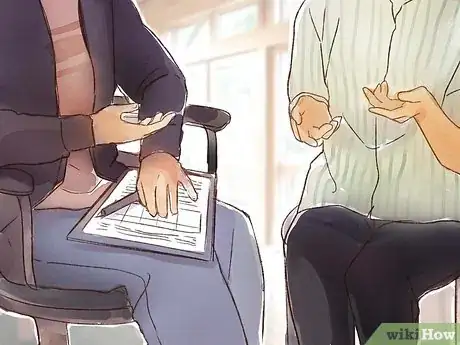
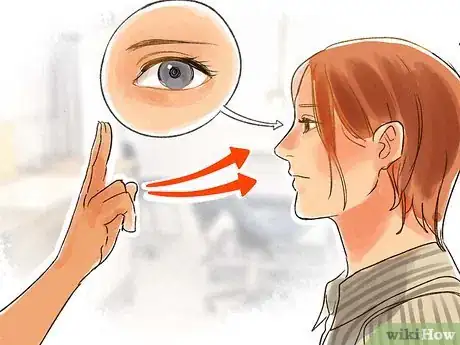





























































Medical Disclaimer
The content of this article is not intended to be a substitute for professional medical advice, examination, diagnosis, or treatment. You should always contact your doctor or other qualified healthcare professional before starting, changing, or stopping any kind of health treatment.
Read More...